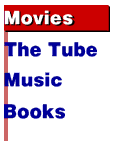|
| ||||||
|
HOLIDAYS 1998
| FEATURE | LAST | The Sream Effect | Apt Pupil ARCHIVES | Movies
|

Gus van Sant's recently released scene for scene recreation of the Hitchcock classic "Psycho" brings to light some issues about the present state of film making. It isn't that remakes are an unusual occurrence in American cinema, but quite the opposite. The great promise and opportunity with remakes is that they can take a fresh look, reworking a story to mirror present day concerns. The original "Invasion of the Body Snatchers" (1956) was a disturbing nightmare that reflected the communist witch hunts during that time even though it was a science fiction film. The film was remade in 1978, the setting changed to San Francisco, and reflected the paranoia of this country in post Watergate times. It is phenomenal that both of these films stand alone as classics in their own right, telling essentially the same story but infusing and sparking their stories with relevant social context. Alas, a 1994 remake, entitled Body Snatchers, was an uninvolving film that did not have a strong interpretation to propel it. Any film is a product of its times. The original "Psycho" (1960) was shocking in numerous ways, principally for the way in which it constantly misdirects and furnishes red herrings to the viewer. Furthermore, the audience is completely thrown off balance by the elimination of the principal character thirty minutes into the film. The music score by Bernard Hermann was endlessly imitated and is the symphonic equivalent of madness and murder. And it isn't just a horror film. It is a film about identity, about people not being what they appear to be, about the contradictory natures in all of us (note how many times mirrors and double imagery is used in the film). The motif of birds runs through the film as well, from the name of the victim (Marion Crane), to the photos of birds on the walls and the taxidermic creations of which Norman Bates is so proud (especially the one you don't see until the end). Bates himself says that he sees birds as passive creatures, easier to stuff than other animals that he sees as more life-like. And his references to how Marion Crane eats (like a bird) suggests that he sees women as objects. The easier to kill them, no doubt. "Psycho" succeeds singularly in mounting suspense. And this is a trait not seen in films very often these days: the confidence and sensibility to be patient. Hitchcock's "Psycho" had a total of two on screen murders in it. The entire first thirty minutes of the film moves the story along but it's not the real story, merely a prelude to the larger mystery. The slow ascension to the hill-top house is a journey into understanding that secret. Hitchcock uses inventive camera movements, but only sparingly and when they fit the story. But today, the pyrotechnic special effects, overt nudity, quick cuts and modern flamboyant camera movements are just too tempting for most film makers and are used indiscriminately. Suspense requires patience and it seems that most film makers don't believe that modern audiences will stick with it. In suspense, less is more. Is Hitchcock as a film maker so untouchable that he can't be reworked by talented film makers without being derivative? Brian de Palma went to the Hitchcock well so many times that the suspense and overblown musical scores made one wonder if he had any directorial voice of his own. If you see "Dressed to Kill" or "Blow Out", frankly, it's embarrassing to see how badly they've held up over time, from music scores so lush it'll give you insulin shock to acting that is so stylized and stilted it's like watching the outtakes from the movie. It is not a criticism of van Sant except in the sense of his judgment. As a film maker he must have considered how to modernize the material (aside from adjusting the stolen money amount for inflation from $40,000 to $400,000 and replacing a few dated phrases). At this point it would have been just as easy to enlist the help of Ted Turner and colorized the 1960 original, or replace the heads of Anthony Perkins, Janet Leigh, and Martin Balsalm with Vince Vaughn ("Swingers", "The Lost World"), Anne Heche ("Six Days, Seven Nights", "Return to Paradise", "Wag The Dog"), and William H. Macy using modern computerized technology. And perhaps it is also a comment that film makers don't seem to specialize anymore. Gus van Sant, though a talented film maker, doesn't seem to be someone who is in the line of succession to the Master of Suspense. This strikes one as dabbling. Almost as if he's saying 'I'm Doing This Because I Can.' The "new" Psycho is a classic exercise in form without substance, in getting lost in a gifted director's footsteps. Rather than reworking a story and visuals into a modern statement of what is happening in today's world, van Sant is blinded by the stature of a great director he can only be a fan of and admits by his approach that he has nothing new to say. Hitchcock had plenty to say and spent 53 films doing it. Maybe the bottom line is that the new version of Psycho does reflect our present society. After all, cloning is the raging topic these days. TIM CLIFTON is a contributing writer. |
|||||
 |
||||||
|
Complete Contents | FEEDBACK | Questionnaire | Archive | Author Biographies | Mailing List |
||||||



 THE ORIGINAL movie poster from Hitchcock's classic
THE ORIGINAL movie poster from Hitchcock's classic